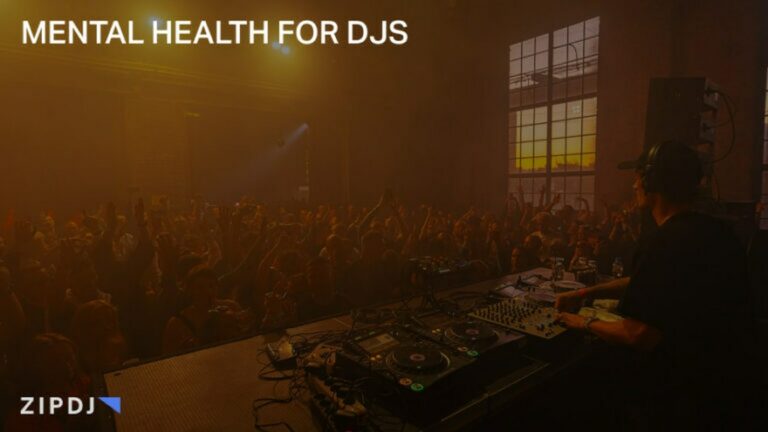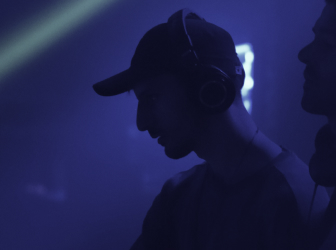Mental Health For DJs: 10 Tips To Avoid Burnout In 2025

The best strategies for improving mental health for DJs incorporate several factors, from eating healthily to fostering new skills.
When used in combination, these techniques can help reduce stress and depression while also invigorating a sense of creativity.
Read on, and we’ll cover the full range of ways working DJs can address the negative lifestyle decisions that lead to burnout.

Mental Health For DJs: 10 Tips To Avoid Burnout In 2025
DJs can adopt various effective methods to help reduce stress, anxiety, and depression caused by overwork.
We’ve ensured this guide covers physical and mental techniques to bring a broad set of tools to help DJs cope with burnout.
Without further ado, here are our tips to improve the mental health of DJs:
10. Talk To A Professional
The lifestyle of a professional DJ can lead to many mental health problems, from a lack of sleep to anxiety and depression.
While you can take steps to rectify these problems, if it becomes overwhelming, you should seek professional advice.
This could mean speaking to your doctor or consulting an integrative psychotherapist to get to the root of your mental health issues.
You can look out for several tell-tale signs if you think you might need help, such as a lack of motivation and loss of energy.
Excessive partying, late nights, and jetlag from travel can all build up over time to create debilitating periods of depression that need to be addressed.
Fortunately, there is a growing trend among the DJ community to discuss self-care, mental health, and well-being.
Speaking to a professional, whether this is a psychotherapist or counselor, is more acceptable than ever before.
Organizations such as the Music Industry Therapist Collective have been set up to help DJs overcome mental health challenges.
If you’re struggling with mental health issues, contact the relevant organizations to explore therapy as a solution.
9. Vary Your Gigs & Venues
Another effective method for improving mental health and well-being is to diversify the venues you choose to perform at.
Working with new event promoters and reacting to different crowds will spark a renewed focus on your approach to DJing.
If you’re relatively new to DJing, you can find out how to get DJ gigs and reach out to venues that might be interested in hosting your sets.
Connecting with influential people in the music industry will also give you new opportunities to network and make friends.
It doesn’t have to be at a big club; performing at local house parties and bars will alleviate the boredom of playing the same gig week in and week out.
Varying your gigs and venues also opens opportunities to network with other DJs and share your experiences with a sympathetic ear.
By nurturing a community of DJs, you can help to create a support network that values the artist’s mental health and increases self-awareness.
8. Explore New Genres
Many DJs prefer to stick to one or two music genres for their DJ sets, but over time this can start to feel stagnant and uninspiring.
If that’s the case, branching out and exploring different genres could be an excellent way to fire off new synapses and reengage your brain.
While many DJs focus primarily on dance music, some of the best music genres for DJs cover a diverse range of styles worth listening to.
Classical music, jazz, and blues are great musical styles that can help expand your horizons beyond what electronic music offers.
These diverse styles can inspire how your style evolves in the future, discovering new samples to use in your sets.
You can also watch and listen to sets from other DJs focusing on different genres for additional motivational sparks.
As well as opening your mind to new genres, watching other DJs can expand your horizons regarding skills and techniques you can learn.
Once you’ve integrated these genres and techniques into your style, you’ll be able to take exciting risks at your future gigs.
7. Develop New Mixing Techniques
There is a broad range of mixing techniques available to DJs, and mastering all of these would take a lifetime to accomplish.
If you’re stuck in a creative rut, it could be partly due to an over-familiarity with your DJing style and a failure to evolve.
Poor mental health is often associated with the feeling that life isn’t progressing, and a great way to counteract this is to learn new things.
With the future of DJing full of fascinating possibilities, it’s worth diving into new technology and software to enhance your sets.
This could be as simple as mastering new transitions to add variety to your mixes.
It can also involve exploring emerging technologies and software that allows you to remix on the fly and work with effects and samples.
Likewise, algorithm-based tools that are in their infancy offer incredible scope for new mixing techniques to explore in depth.
The mental health benefits of learning a new skill are well documented, making developing new techniques a must for DJs experiencing burnout.
6. Spend Time Researching
Sometimes burnout can result from focusing too much on one thing at the exclusion of everything else.
DJs can quickly become obsessed with tracking down the latest dance music and keeping abreast of trends that affect their careers.
If this is the case, taking a step back from music and researching other topics can help alleviate burnout.
This research could be about anything that intrigues you and helps you to develop a broader personality with eclectic interests.
If you’d prefer to spend this time researching subjects related to your professional career, there are many ways to expand your skill set.
Learning skills such as graphic design and marketing can help you to expand your business and more effectively reach new fans.
Another noteworthy subject to research if you’re struggling with mental health issues, is the psychology of music and how it affects mood.
Understanding how music can reduce stress can help you to explore your passion for music and improve mental health in the process.

5. Avoid Unnecessary Social Media
An increasing number of studies demonstrate the link between poor mental health and excessive use of social media.
Young people are especially prone to these adverse effects, with feelings of stress, anxiety, and depression correlated to social media use.
For many DJs, social media networking is an essential aspect of their lives, from checking out the best TikTok DJs to promoting events.
Yet while social media can be beneficial, they can also breed hateful content and negativity when used to excess.
This can lead to an unhealthy reliance on likes and comments for your daily dopamine hit and increased pressure to deliver fresh content.
It can also engender feelings of narcissism and disconnect between your online presence and your authentic self.
With so many DJs relying on social media platforms for promotion and engagement, shunning it entirely isn’t an option.
But setting aside time from updating your social media pages to focus on different things should be a part of your routine.
4. Maintain A Positive Mental Perspective
Depression, anxiety, and other mental health issues associated with burnout can be alleviated through various processes.
Meditation and other mindfulness exercises are becoming increasingly popular among working DJs with hectic schedules.
This can include practicing breathing exercises, learning yoga, and attending classes on transcendental meditation.
These techniques can be used to foster a positive mental attitude and view your career through an optimistic lens.
Instead of succumbing to the pitfalls of DJing, such as status anxiety, such techniques can help you to put things in a fresh perspective.
This includes developing a positive vision of the future rather than dwelling on the mistakes of the past, which trigger anxiety.
Spending time away from technology and venturing into the natural world is another way to have a mental spring clean.
Getting involved in local nature projects has been proven to improve mental health, so consider joining local projects in your area.
3. Avoid Alcohol & Substance Abuse
Few professions have such a close association with alcohol and substance abuse as DJing, with drugs a ubiquitous aspect of clubbing.
The temptation to take drugs is ever-present in the club scene, with a potential abundance of party drugs available at the drop of a hat.
It can be just as easy for DJs to lean on alcohol and drugs as a coping mechanism, indulging in excess as part of the lifestyle.
But cleaning up your lifestyle and eliminating bad habits is more important than knowing how to clean your DJ gear after a gig.
You should extend the same care and attention to your physical and mental health as you do your equipment so that you can perform optimally.
This is easier said than done, particularly if you’ve spent a lot of time in the company of people who revel in hedonism.
To break out of this cycle, you may need to take a break from cliques where alcohol and drugs are the norm.
In extreme circumstances, DJs with serious addiction issues may need to seek out professional help and enter rehab.
Fortunately, there are many support networks, such as AA, you can contact if you’re struggling with addiction and substance abuse.
2. Fix Your Diet & Exercise
Diet and exercise are intimately associated with one another, with effective exercise impossible if you have a poor diet.
If you’re not eating correctly, your energy levels will decline along with your mental health leading to irritability and bad moods.
Many DJs develop a poor diet due to constant travel, which makes it difficult to consistently eat healthy food on a daily basis.
This can be overcome by putting together a plan for meal preparation that uses healthy ingredients and avoids fast food.
Discarding heavily processed food and favoring organic fruit and vegetables will help restore energy, focus, and overall well-being.
Once your diet is optimized with the right balance of proteins, vitamins, and nutrition, you can introduce exercise regimens.
Running, swimming, and regular visits to the gym will all help improve your cardiovascular function and keep you fit and healthy.
Exercise also releases endorphins into the bloodstream, which reduce stress levels and boost your mood and self-esteem.
1. Take Consistent Breaks
Many DJs are familiar with the experience of dreading an upcoming gig and how what was once a pleasure has become a chore.
Even the highest-paid DJs in the world will experience burnout from traveling long distances to perform at international venues.
Taking a break from DJing could be your best decision if you’re struggling with physical and mental health issues.
Booking fewer gigs, or canceling all upcoming gigs entirely, can give you the time and space to fully rest and recuperate from a busy schedule.
Whether you block off a few weeks or several months, this break allows you to recharge your batteries and return with enthusiasm.
You can use this time to address many of the abovementioned steps, exploring and restoring your passion for new music.
It’s also an excellent opportunity to step back from music altogether and nurture projects and hobbies away from the music industry.
Once you’ve reflected on your strengths and weaknesses and addressed your lifestyle, you can return to DJing with a positive mindset.
Summary
We hope you’ve found this overview of the different ways to improve mental health for DJs an informative resource.
DJing is becoming increasingly complex and challenging, but the abovementioned techniques will help reduce stress and anxiety.
If you’re struggling with the pressures of DJing, implementing these strategies could help set you on the path to success.
Expand your horizons and join ZIPDJ to discover the latest releases across various musical genres.
Not a member ?
Join Today for Unlimited Music Downloads. Visit zipdj.com for more information.



